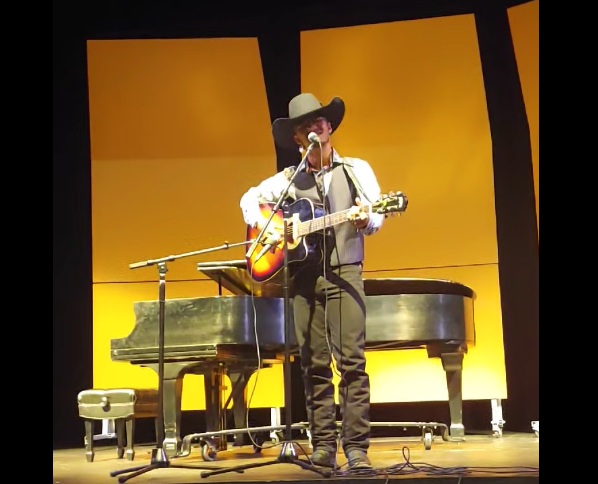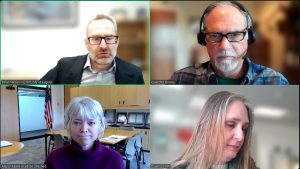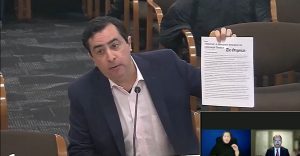Jam with Dakota and the MEPAA community Mondays
8 min read
Echo (KEPW, Underground Echo): Eugene: We have the privilege of stepping into a story of resilience, courage, and the transformative power of music. Across the country we see young people navigating systems not designed for them. Barriers that make opportunity feel distant and a world that often underestimates their voices.
[00:00:19] And yet, within these spaces, something extraordinary happens. A guitar is strummed, a drum is beaten, a song is sung, and suddenly the impossible feels possible.
[00:00:32] Music doesn’t just give you a voice. Sometimes it gives you your voice back.
[00:00:39] Dakota knows this truth firsthand. He’s a young Black man, 20 years old, originally from Missouri, and he came into the world carrying both dreams and the weight of systemic challenges that often shadow talented young artists of color.
[00:00:53] MEPAA–the Music Education & Performing Artists Association–exists to remove barriers, to create spaces where young people can discover their voice, their artistry, and their worth in this journey. MEPAA has been the community that holds him, challenges him and celebrates him, showing that when systems fail young people, we can create alternatives that affirm, elevate, and transform.
[00:01:18] I’m sitting here at MEPAA today with Dakota, a very talented musician. Now every artist has an origin story. You told us a little bit about it, but could you—?
[00:01:29] Dakota Harris: Sure, of course, of course. I was born in Tulsa, Oklahoma, and raised in Nixa, Missouri for the first half of my life. And it is definitely like a different kind of culture shock in a way, going from Missouri to Oregon. But I’ve been living in Oregon since 2016. And that was around the same time I started at MEPAA.
[00:01:46] Echo: What role did music play for you during moments when you felt maybe misunderstood or marginalized?
[00:01:52] Dakota: Oh, yeah. Music was definitely like a helpful thing for me even though I was in Oregon, though, you always get those moments sometimes. I’ll walk in, and I’m all dressed up and everything like a person of color or Black person, you know, like they expect like rap or something like that.
[00:02:06] But then I just play some like old, like Chuck Berry or even country music, like George Strait or whatnot. And they would just be completely surprised, you know? They’d be like, ‘What? No way. No way.’ I usually get that quite often, but I always like perform and everyone smiles, you know, like they never think about it. But yeah.
[00:02:21] Echo: Yeah. It’s ingrained in us so deeply we don’t realize that we’re being racist.
[00:02:26] Dakota: Oh yeah, yeah, music helped a lot with that, you know? ’cause I was just, you know, ’cause other than that, people would misunderstand me quite a bit, but when I played music, it was like, ‘Oh yeah, cool beans. Cool beans.’
[00:02:36] Echo: Can you tell me a little bit more about MEPAA and what that process was like for you?
[00:02:41] Dakota: Oh yeah. For me, I can remember the first time. It was like, ’cause I, I was a very shy person and the first time I ever done it I was at actually a Music Master. And they had these rooms in the back. I would literally be under a table with a guitar ’cause I was so shy, you know?
[00:02:54] And Sean Brennan, he would teach me guitar and slowly but surely I’d get out and then I would eventually play in the groups and yeah. And that’s how I met some of my closest friends and started performing, started socializing more. ’cause I was terrible at socializing, you know? Yeah, hearing me now, you would never guess that.
[00:03:09] Echo: I would never have guessed that meeting you today, Dakota.
[00:03:12] Dakota: Oh yeah, definitely. But yeah, and it helped me quite a bit in that way and making a lot of friends and having a safe place to perform and learn, you know, and have fun.
[00:03:21] Everyone has this feeling somehow, like with different things where it’s like, ‘Oh yeah, when I’m doing this thing, the whole world’s just kinda quiet, you know? It feels good, you know?’ That’s what music is for me. When I step on stage, I get that guitar and I start playing, it’s like my brain is just a single thought. And it’s like the best thing in the world, you know, kinda like it’s my happy place. You know, the stage is my happy place.
[00:03:41] Echo: Absolutely. That flow state is incandescent. (Mm-hmm.) Did joining MEPAA the community shift your path, your confidence, and your sense of belonging?
[00:03:52] Dakota: Oh, definitely. Definitely. ‘Cause first of all, I didn’t socialize a lot, so trying to get in any type of group was difficult, you know? My sister, she was a natural. She’d be like, ‘Oh yeah, boom, there you go.’ Ready to go in middle school, high school. But me, I was like, ‘Nope. I’m trying to figure out where I fit in.’ And MEPAA was that place where I fit in. You know, it’s like a special place where it’s like I’m sharing a common thing with people and I’m like, ‘Oh, this is great,’ you know?
[00:04:14] I help with the group jams and I usually, I play guitar and help teach guitar. I teach bass as well, and some piano as well. And yeah, and I always love teaching, teaching people having fun. And I also help clean the guitars and tune ’em and make sure they’re ready for the next jammers, you know?
[00:04:30] Echo: You carry stories through your sound.
[00:04:33] Dakota: Oh yes, definitely.
[00:04:33] Echo: So what is the story you’re trying to convey to your audience?
[00:04:38] Dakota: About two years into playing music (I’ve been playing for about eight or nine years) and I worked in a Memory Care, like, playing music in Memory Care. And it would help people bring them back to that special place or bring back memories and stuff. And that’s kind of how I kind of think of my music in a way. I play it and people are like, ‘Oh, I remember that song.’ Or like, ‘Oh, I remember that day.’
[00:04:57] Or sometimes songs like can have a different feel, you know, kinda like a slow song can really just like make someone just feel the song. Or a really fast one, just people like, ‘Oh yeah, I’m just singing, playing,’ you know. And that’s one of my favorite things about music is that it can change how people feel, you know? (Yeah.) You can put ’em in a certain state of mind. I’m like, oh, yeah, that’s awesome.
[00:05:19] Echo: Absolutely. Mentorship can change everything. Is someone at MEPAA or in your life a mentor for your music?
[00:05:26] Dakota: I’d say like the first thing that comes to mind: My mom, you know–
[00:05:31] Echo: Shout out to mom.
[00:05:32] Dakota: Yep. Yep. Shout out to mom or momager. She’s my momager.
[00:06:17] Echo: That’s amazing.
[00:05:36] Dakota: Yeah. She always helps plan out gigs sometimes. Yeah, she always, she helps me with the social part sometimes, ’cause she actually used to be a performer as well. She would perform in karaoke a lot and she would win state championships all over. So she would tell me, ‘You’ve got to give ’em a show, you know, don’t stand there the whole time,’ you know, or whatnot.
[00:05:53] But she always helps me up and always brings me up, you know, if I’m feeling down or I’m like, ‘Oh, I can’t do this.’ She’d be like, ‘You got this. You performed in front of hundreds of people, you got this, you know, never give up.’ And yeah, my mom’s always been my number one supporter, you know?
[00:06:07] Echo: That’s amazing to hear.
[00:06:08] Dakota: Yeah. And she’s definitely a mentor, ’cause whenever I have things I want to know or I’m like, ‘Ahh, I’m having a hard time,’ I’ll always talk to my mom, you know. My mom always knows what to say.
[00:06:21] Echo: So is there a song you’ve written that has really been important to you?
[00:06:28] Dakota: I’d say the song I wrote was called A Pacemaker of Gold. My mom, she had a heart attack in 2013. She died three times and she survived the fourth time. But yeah, the song I wrote for her was Pacemaker of Gold, and it’s pretty much about like, my mom, you know, her pacemaker’s made out of gold, or her heart’s made out of gold, you know?
[00:06:46] Because she’s taught me how to be caring, you know? Or like, for example, since it’s like close to the holidays and stuff, every Christmas, you know, we would always drive in the snow with little gift baskets. And we’d give them to the people working at the gas stations or still working on Christmas or whatnot.
[00:07:02] Echo: That’s amazing.
[00:07:02] Dakota: And yeah, and she would always teach me like, if someone needs some help, you are the first one to get up and go help ’em out. And yeah. And she’s been a very big inspiration.
[00:07:12] Echo: So, looking ahead, what dreams do you hold for your music, and how do you hope to use your voice to inspire others who come from where you came from?
[00:07:20] Dakota: I hope to inspire people where it’s like, ‘Oh yeah, you can play music, you can play whatever you like, you can dress however you want, you can perform on stage.’ And yeah, and I want to just make sure that I keep that path paved for people so that people can be like, ‘Oh yeah, I can do that too.’
[00:07:36] ‘Cause like, especially growing up as well, I don’t really get to see a lot of role models who are specific to me sometimes. I’m a very country person, you know, but I’ve never really seen like Black cowboys very much besides like my cousin’s best friend. ‘Cause like my family were a lot of bull riders as well.
[00:07:52] ‘ Growing up I was like, ‘Oh, I want to be a country artist.’ But I never see a lot of like Black country artists besides Charlie Pride. And then I see these new artists, I’m like, ‘Oh, that’s cool,’ you know. I’m like, ‘Yeah, and I want to pave the way,’ kind of like that. Yeah.
[00:08:03] Echo: Anybody you want to shout out before we go?
[00:08:05] Dakota: Oh, yeah. I want to shout out to my mom, Shonda Harris, and also Matrisha (Armitage) as well, you know, Matrisha having an amazing MEPAA organization and being an amazing boss as well, and always inspiring people to keep on getting better and having fun.
[00:08:21] Echo: This community that I’ve walked into already feels like a family.
[00:08:24] Dakota: Oh, that’s how it feels, you know, we’re very much interconnected.
[00:08:27] Echo: Join MEPAA at 2370 Parliament Road, Mondays from 6:30 p.m. to 8:30 p.m. and you can be a part of the MEPAA family too.
Image courtesy Dakota Harris Music on Facebook.






